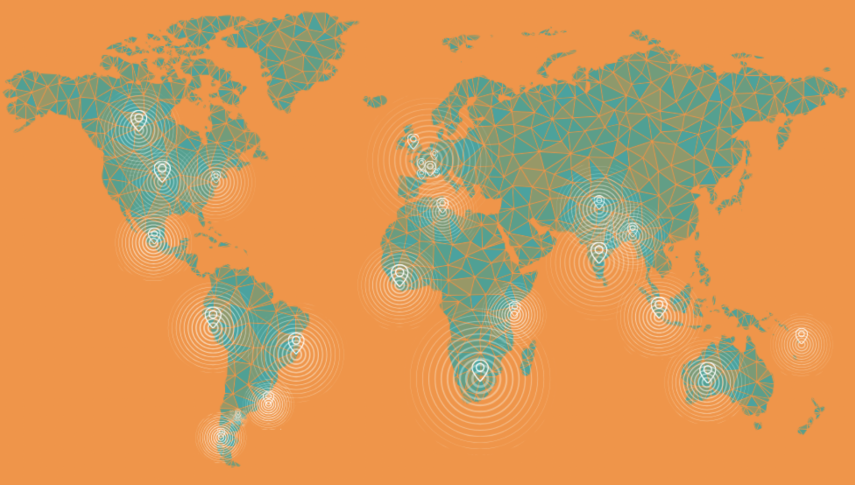
Is it still possible to create a just digital future for most people, without leaving marginalised communities behind? For dozens of civil society organisations that have been defending digital rights since the early days of the internet, the answer is yes – but the current moment is one of deep concern. They are part of the Global Digital Justice Forum (GDJF), which is launching the #DigitalJusticeNow campaign during this year's Internet Governance Forum (IGF) to amplify a collective vision of the digital future by sharing testimonies about what digital justice means to us and how we can achieve it.
Describing this as a turning point in which centring Southern perspectives in digital policy-making forums and their spaces of multistakeholder dialogues is more necessary than ever, APC and IT for Change convened a strategy meeting in February this year in Johannesburg, bringing together the Global Digital Justice Forum. The Forum was created to help civil society organisations in the Global South and their allies in the North build a common agenda for the World Summit on the Information Society (WSIS) 20-year review process, as well as other global digital cooperation processes including the upcoming IGF. This coalition of civil society organisations from the Global Majority acts as an advocacy network that promotes rights-based policies and demands a digital order that prioritises people and the planet over profit.
“At Colnodo we have worked for over three decades to ensure that digital technologies serve communities, not the other way around. Through community networks in rural Colombia we have seen how access to the internet can transform lives when they are driven by the people. Connectivity is not just a technical issue. For isolated communities access to the internet means access to education, health information and the ability to participate in democratic lives. That is why we believe digital rights are human rights. And they must include the right to build and govern our own networks.”
- Julián Casasbuenas, Colnodo (Colombia)
In May the GDJF issued the Digital Justice, Now! call to action for WSIS+20 and beyond that has already been endorsed by over 70 organisations. The call offers practical recommendations to ensure transparency, inclusivity, and meaningful stakeholder engagement in the IGF and the WSIS+20 review - two milestone processes in internet governance taking place soon.
The next step is to bring even more voices together to build on the power of joint action. To that end the GDJF is launching a campaign to push for a bold, people-first agenda for reclaiming the digital future.
Why does global digital justice matter today?
The campaign aims to influence the WSIS+20 review process by bringing together voices from civil society organisations and people’s movements in the Global South, and will be a vital opportunity to contextualise the core vision of the World Summit on the Information Society (WSIS) for a people-centred and inclusive information society by grounding it in diverse lived experiences. It brings to the fore voices from around the world representing small farmers, platform workers, Indigenous communities, climate activists and other constituencies whose demands rarely reach the policy table.
“Why digital justice? The profound inequalities of our shared present are deeply intertwined with our technological paradigm – a paradigm that has, with all its promise for liberation, only produced economies of exploitation and societies of exclusion. The fundamental human dignity of the most marginalised person depends on uprooting digital injustice. The Global Digital Justice Forum's call to action is about reclaiming digital power for the people. We seek actions from our governments and the international community so that individuals and communities everywhere can shape their democratic digital destinies, a digital future of dignity and justice.”
- Anita Gurumurthy, IT for Change (India)
A call to action for civil society
Within its agenda, the Forum posits that the current approach to global digital governance has been characterised by corporate dominance and state control, deviating significantly from the ideals set forth by WSIS two decades ago. The proliferation of data weaponisation, artificial intelligence (AI) misuse and escalating environmental crises underscore the pressing need for a paradigm shift. The Forum emphasises that this juncture represents a “now-or-never” moment to reclaim the digital space for the common good.
The WSIS+20 review process marks the 20th anniversary of the original WSIS held in Geneva and Tunis and provides an opportunity to assess progress and recalibrate strategies to defend an inclusive and equitable digital future.
Already widely endorsed by civil society groups and experts, the campaign calls for the WSIS+20 review to uphold the following:
- Agenda 1. Human rights adequate to the digital paradigm
- Agenda 2. The internet as a global communications commons
- Agenda 3. A just international economic order based on the principle of digital non-alignment
- Agenda 4. A sustainable digital transition that safeguards the human rights of future generations
By endorsing the Forum's call to action, civil society can contribute to a pluralistic voice advocating for digital justice, ensuring that the experiences and needs of communities are embedded in global digital governance discussions. To that end it is actively mobilising civil society groups to endorse this campaign and participate in forthcoming initiatives, including IGF 2025 and the WSIS+20 High Level Event in June and July.
Find out more how to get involved: https://globaldigitaljusticeforum.net/